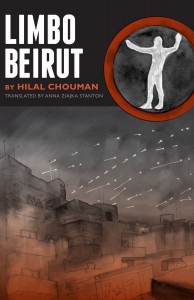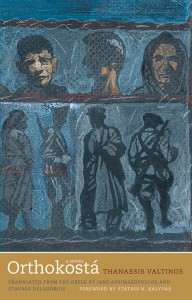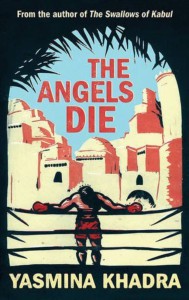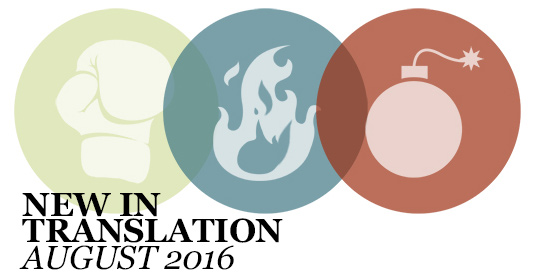
Limbo Beirut, by Hilal Chouman, tr. Anna Ziajka Stanton. Center for Middle Eastern Studies, The University of Texas at Austin. Review: Claire Pershan, Assistant Director, Educational Arm
Beirut is a city of collisions. Bad drivers, sudden friendships, graffiti in a mess of languages. And yet, when enough chaos collides, it produces its own order—the way a sprawling city looks from far away.
This is the effect of Hilal Chouman’s latest novel, Limbo Beirut, recently translated from Arabic into English by Anna Ziajka Stanton, and published by University of Texas Press. Chouman’s novel fills the space between history and memory. Six narrative chapters document the fighting that broke out in the city in May of 2008, as it was experienced by the city’s residents. These clashes, between Hezbollah and pro-Syrian militias on one side, and members of the Sunni-supported Future Movement on the other, didn’t gain much attention from western media, but for the Lebanese people, they were a frightening echo of the Civil War that devastated the country between 1975 and 1990.
“How do we pick the moments at which our stories begin,” wonders Hassan. Burdened with guilt from serving in the militia, he has devoted himself to finding happiness for his paraplegic brother Rami, who is studying in Hamburg. Limbo Beirut is one response to his question. Chouman’s narrative structure explodes subjectivity. His figures collide with their own memories, with each other, in ways that make me wonder: in the context of conflict, how discrete are our individual consciousnesses? When our perception of the present is continually assailed by our recollection of the past, where precisely are the edges of our experiences?
“I thought that we live among the reflections of time’s sadness upon all things,” reflects another character, a young doctor-in-training. In the passenger seat of a Service, after back to back shifts in the hospital’s autopsy room, he tries to make sense of his breakup, to move on with his life—when the end of love, like the end of war, is not as decisively clear as death.
“Screw this country. No offense to you, sir, esteiz.” As I had decided to talk to him, I agreed, “My God, yes, a thousand times over. You’re right.”
Each of Chouman’s characters is struggling to find logic in their lives, and to unstick themselves from something. The explosions in their city serve as the backdrop to the rest of their uncertainties. Meanwhile, visual authors Mohamed Gaber, Fadi Adleh, and Barrack Rima, provide us with another permutation of the events, intimate illustrations of each individual’s ruminations.
Walid and Alfred are trying to keep things casual, commuting between each other’s apartments in Caracas and Rue Clemenceau. Salwa, sixth months pregnant, is hit by a car crossing the street. In the hospital, she solves word puzzles while sorting through her memories and analyzing a bizarrely loveless marriage. A frustrated novelist tries to make sense of his life through his writing, but estranging himself from his girlfriend in the process.
“A year passed while we were in London. Things were happening in Lebanon to destabilize the status quo there. Then 2005 passed. 2006 flew by. I began to ask myself, Is it the place? Can I really be productive in a place I’ve lived in only briefly? Can I write a story whose events take place in Lebanon while I watch what’s happening from outside? Can such a thing be done remotely, using online searches, smart technology?”
Lebanon is a country locked in on all sides by violence—the Syrian civil war to the north, the Palestinian-Israeli conflict in the south. By necessity, Lebanese identity transcends its borders. Lebanese diaspora live across the world—Toronto, Dubai, Michigan, California, Brazil. Limbo Beirut shows the transnationalism and the transience of this country, the continuous movement of Lebanese people to earn doctorates in Germany, to chase loved ones to Japan, to build and rebuild homes.
If one purpose of world literature is to carry an experience beyond its borders, to unstick an event from a single mind, or place, or language, then Chouman’s novel and Stanton’s translation achieve this task together. Those readers who have passed at some point through Beirut, will find themselves drawn back along its streets overcrowded with triple parked cars, to the Corniche overlooking the Rauché rocks. And those unfamiliar with Beirut will discover it here in all its chaos and detail; they will be pulled with equal force into its tense and tender embrace.

Orthokostá by Thanassis Valtinos, tr. Jane Assimakopoulos and Stavros Deligiorgis. Yale University Press. Review: Theophilus Kwek, Chief Executive Assistant
It is unusual that a novel in translation receives a long and learned foreword by a politics professor, but Stathis Kalyvas is no ordinary professor, and Orthokostá (first published in Greek in 1994) is no ordinary book. Set in occupied Greece, the novel’s events are told through—victims, former soldiers, their families, bystanders, and others—which map a region’s internecine conflicts with granular detail. Because the narrators hail from different localities and loyalties, and different stations in life, the book presents a powerful illustration of the ‘Rashomon’ effect, in which the unsettling subjectivity of the telling is part of the tale itself.
Context is essential to understanding what Stavros Deligiorgis, one of the book’s co-translators, calls its “provocative polyphony.” Kalyvas, author of the ground-breaking The Logic of Violence in Civil War (Cambridge University Press, 2006), discusses in his new foreword how the politics of resistance and collaboration altered and undermined relations between nationalist and Communist factions in the latter years of German occupation, and helpfully demonstrates how fragments of text fit into this equation. At the same time, by associating the geography of this conflict with the Peloponnesian War and the founding uprising of the modern Greek state, Kalyvas suggests that a “powerful historical charge” undergirds popular consciousness and lends an inescapable backdrop to the present drama.
We hear the echoes of both present and past conflicts throughout the book. The narrative—all 47 chapters of it—is preceded by an account of Orthokostá, a monastery in Orióntas Province, and its flourishing, pastoral surroundings, ostensibly by one Isaákios, Bishop of Rhéon and Prastós. This supplies a deft and immediate contrast with Chapter 1 (“All day long the wind carried ashes down toward us”) where the natural world is itself drawn into, and tainted by, the civil war. It is not until the very end of the narrative that a corresponding epilogue reveals that the bishop, impeached for heresy, was detained at the monastery, and that his descriptions of the region’s beauty “ought simply to be taken as the poetic escapism of a repressed existence.” And yet. Because we have just learned that no narrator can be fully believed, we inevitably doubt both the eighteenth-century bishop and his doubters.
Just how has this psychological double-bind been achieved? Thanassis Valtinos, as the translators tell us, intends to depict “not history itself but the recording of history”, by presenting as raw truth the very different ways in which we remember the same thing. From early in the narrative, each voice tries to distinguish itself against the others: “They kept saying that only the reservists had fought…This is all lies, of course. I should know.” Each voice also attempts to discredit others by offering various motives for their discrepancies: “That was their method. To project an image of power, an image of strength. But of course the others did the same, now didn’t they? Absolutely. What else can I tell you?” These claims of truth and counter-truth are complicated further where particular actors remember (imperfectly) various acts of truth-telling. In Chapter 29, for example, one narrator is told to “please report it in writing, everything, from the time you went to Astros, whatever you saw”—a tall order given everything he has just seen, “all that sordidness.” What is believing if seeing itself is compromised?
It is to this rich, thorny mix that Assimakopoulos and Deligiorgis’s English translation adds yet another voice. Their stripped-back style is an essential part of the brutal experience that unfolds in the text; instead of falling back on standard translators’ tools of wit and wordplay, they prove in an almost tactile way that the English language retains its earthy side. Some passages read almost as prose poetry: “He was banging the butt of his gun against a door…Before they even brought his brother to Trípolis. He knew that Tsígris was being interrogated there. And he took out his gun and shot him in cold blood. He settled the score.” The razor-sharp dialogue, dynamic rhythm and careful grasp of detail are the aural equivalent of a Scorsese film, persuading us to accept each perspective and pushing the story forward.
As Deligiorgis rightly notes, books like Orthokostá “make for fractured readings in times of fractured collectivity.” The shattered society depicted here rings all too close to the truth of post–Cold War balkanization, post–Gulf War Iraq and post-intervention Syria, as well as our own worst projections of a post-EU Europe. Together, authors, translators, and scholars such as Valtinos, Assimakopoulos, Deligiorgis and Kalyvas have done valuable work in showing that especially in such times, every voice—every hurt, fallible, charitable, vengeful, human voice—matters. We would do well to read, and to listen.

The Angels Die by Yasmina Khadra, tr. Howard Curtis. Gallic Books. Review: Nozomi Saito, Executive Assistant
“Nobody can escape his destiny. Destiny? Only exceptional people have one. Common mortals just have fate…”
Resigned to his fate on the eve of his execution, Turambo is just steps from the guillotine when the novel catapults the reader back into his past. From a childhood of poverty in rural Algeria, to the hard work of making a life out of limited opportunities in the city of Oran, through to Turambo’s hard-fought path to becoming a celebrated boxer, the majority of the novel is set in the interwar period in an Algeria still struggling for liberation from French colonialism. The Angels Die gives roumis, non-Muslims, a bird’s-eye view of the interstices of colonialism, racism, poverty, and the ravages of war that permeate the lives of Turambo and those he loves, whether they are Arab or European, Muslim or Christian. Howard Curtis’s newly published English translation The Angels Die from Algerian literary giant Yasmina Khadra is full of surprises that ultimately leave the reader astonished, as if caught by Turambo’s lethal left hook.
To say that The Angels Die is about the rise and fall of an Algerian boxing champion, however, is deceptively simple, much like the deceptive simplicity of Turambo as narrator. Turambo’s insistence—“It was written, but I’m illiterate”—only thinly veils the aged wisdom of a man whose retrospection gives readers insight into the circumstances and cultural forces that shape the lives and actions of the people around him. The retrospective narration gives Turambo’s point of view a maturity that might otherwise be lacking in a chronologically straightforward narrative, and the subtle wisdom of the older Turambo eloquently saves the opening scene—the flashback narration of a man in the final moments before his death—from seeming trite.
Although a bildungsroman about becoming a man—with the boxing theme, the pain of the absent father, and growing up in a male-dominated world—it is telling that the major sections of the novel are named after the women who play the most formative roles in Turambo’s life. Perhaps this should come as no surprise, given that the author is Yasmina Khadra, the pseudonym of Mohammed Moulessehoul, who adopted his wife’s name in order to avoid censorship while he was an Algerian army officer. In a featured piece by the Independent, Khadra explained that his continuation of publishing under his wife’s name even after he revealed his true identity is “not just a tribute to her, but to Arab womanhood in general. In some Arab countries, women account for as much as 6o percent of the population, and are still completely marginalized.” In The Angels Die, the women are hardly marginalized. Three women are the guiding forces in Turambo’s life, and his encounters with these three women determine his fate. If these figures embody the three Fates of Greek mythology, then Khadra spares his readers the imposition of an obvious and worn out trope, and The Angels Die is, after all, a rewriting of Western misunderstandings, and a profound and insightful response to the Western values and belief systems about the Arab world, values and beliefs that seem all too inescapable in colonial Algeria. The novel, too, is a rewriting of the Aristotlean tragic hero, taking a protagonist who comes not from noble but humble origins, whose rise and fall are still rendered in heart-wrenching scenes that push the reader to question if it is indeed fate or destiny that befalls Turambo, and if it is fate or destiny that determines the course of each of our lives.
The novel’s end gives witness to Algerian independence, but for Turambo, there is no liberation from the tragic arc of his life: “The history of a nation coming to painful birth was being written, putting mine aside. A history in which the miracles had nothing to do with me.” Rather than a nostalgic or self-pitying yearning for the glory of the past, these words remind the reader of the dangers of exceptionalism and the hubris that attends it. Like Irène’s warning to Turambo, that even the most celebrated boxers lose their moment of glory when the public forgets or they are permanently debilitated, the narrative arc of the novel is like the life of a boxer, hard-fought and with as many victories as tragedies, but ending in quiet and somber resolution.
*****
Read more Reviews of New Translations:

